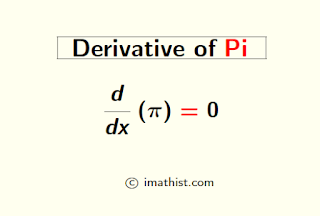The derivative of pi is zero, that is, d/dx(π)=0. Note that pi is denoted by π. In this post, we will learn how to find the derivative of π.
Derivative of pi Formula
The formula for the derivative of $\pi$ is $0$. This formula can be written as follows:
$\dfrac{d}{dx}(\pi)=0$ or $(\pi)’=0$.
Here, the prime $’$ denotes the first-order derivative.
What is the Derivative of pi?
Answer: The derivative of pi is $0$.
Explanation:
Value of pi: The number $\pi$ is irrational, and its value is approximately equal to 3.1415926536 (up to $10$ decimal places).
We know that the value of $\pi$ is given by the area of a circle of unit radius (that is, of radius 1). Note that the area of a circle of radius $r$ unit is equal to $\pi r^2$ $\text{unit}^2$.
As the area of a unit circle is fixed, we conclude that $\pi$ is a fixed number. Thus, $\pi$ is a constant and so it does not change with respect to any variable.
$\therefore \dfrac{d}{dx}(\pi)=0$ by the rule Derivative of a constant is 0.
Thus, the derivative of $\pi$ is equal to $0$.
Also Read:
Derivative of pi by First Principle
Let $f(x)=\pi$. See that $\pi$ is independent of $x$, so we have $f(x+h)=\pi$ for any values of $x$ and $h$. Now, by the first principle, the derivative of $f(x)$ is equal to
$\dfrac{d}{dx}(f(x))$ $=\lim\limits_{h \to 0} \dfrac{f(x+h)-f(x)}{h}$
Put $f(x)=\pi$.
So $\dfrac{d}{dx}(\pi)$ $=\lim\limits_{h \to 0} \dfrac{\pi-\pi}{h}$
$=\lim\limits_{h \to 0} \dfrac{0}{h}$
$=\lim\limits_{h \to 0} 0$ $=0$.
Thus, the derivative of $\pi$ using the first principle, that is, by the limit definition is equal to $0$.
Also Read:
FAQs
Q1: What is the Derivative of Pi?
Answer: The derivative of pi is equal to 0 as it is a constant and the derivative of a constant is 0.
